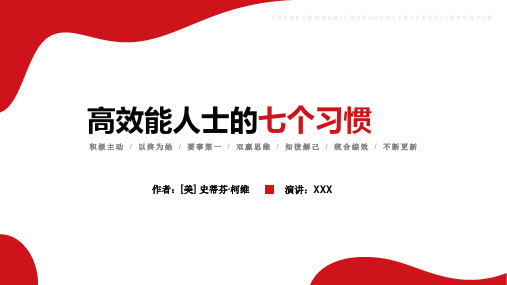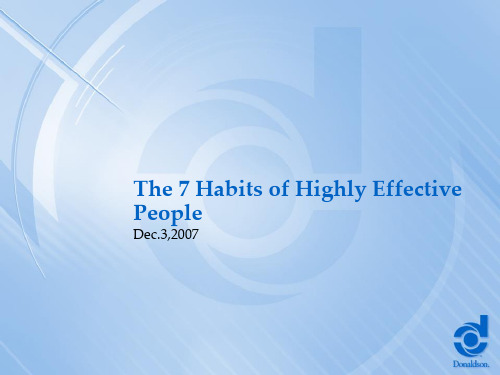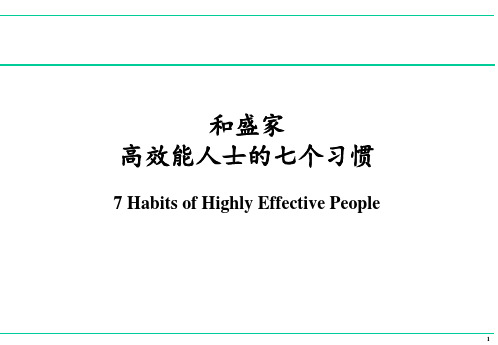7_Habits_of_Highly_Effective_People_高效人士的7个习惯
高效能人士的7个习惯

Interdependence is the paradigm of we, we can do it, we can cooperate, we can combine our talents and abilities and create something greater together.—Achieve success by group efforts.
习惯一:积极主动
Habit 1: Be Proactive
Our basic nature is to act, and not to be acted upon. As well as enabling us to choose our response to particular circumstances, this empowers us to create circumstances.
习惯一 积极主动
Habit 1: Be Proactive
• 积极主动的人有责任感,不把自己的行为归咎于环境或者他 人.
Highly proactive people recognize their responsibility. They do not blame circumstance, conditions, or other people.
The 7 habits paradigm
三个不同的期间
The Maturity Continuum
• 依赖期:围绕“你”这个观念,你照顾我,你为我的成败得失负责; 事情若有差错,我便怪罪于你。--靠别人来完成自己的愿望。
Dependence: Paradigm of you, you take care of me; you come through for me; you did not come through, I blame you for the results.—Depend on others to achieve wishes.
高效能人士的七个习惯PPT

有效沟通的四个阶段
复述语句,使人专心聆听 加入解释,用左脑的逻辑思考去理解 加入个人感觉,右脑发挥作用,体会对方的 心情 左右脑并用,既加以解释,又带有感情
习惯6:统合综效
统合综效即整体大于部分之和,一加一大 于或者等于三,精髓在于判断和尊重差异, 取长补短。
尊重差异
重视不同个体的不同心理、情绪与智能, 以及个人眼中所见到的不同世界
第一次创造:智力上
第二次创造:体力上
习惯2:以终为始
配偶
工作
敌人
享乐
家庭
金钱
名利
原则
朋友
自我
宗教
习惯3:要事第一
偏重后果:
压力大、精疲力尽、 被危机牵着鼻子走、 忙于收拾残局
紧急
偏重后果:
急功近利、被危机牵 着鼻子走,人际关系 肤浅
重要
Ⅰ象限-重要且紧急
危机 迫切问题 在限定时间内必须 完成的任务
习惯二:以终为始。
所有事物都有心智的即第一次的创造和实际的即第二次的创造。我们做任何事都是先在心中构思,然后付诸实现。正因如此,认定使命才显得如此重要。 首先要知道,我们为什么而活着,我们的生活重心是什么:配偶、家庭、金钱、工作、名利、享乐、朋友、敌人、宗教、还是自我。一般而言,我们都是以上某几
种形态的混合体,随情况不同而有所调整。此一时可能以朋友为重心,彼一时或许又变为以配偶为重心。生活重心摇摆不定,情绪上难免起起落落。所以,最 理想的状况还是建立明确固定的生活重心,也就是以原则为依归。以终为始的习惯可适用于各个不同的生活层面,而最基本的目的还是人生的最终期许。太多 人成功之后,反而感到空虚;得到名利之后,却发现牺牲了更可贵的事物。因此,我们务必掌握真正重要的愿景,然后勇往直前坚持到底,使生活充满意义。 认准目标,未来无论发生了什么样的事情,都不要忘记初心,都不要失去方向。
7_Habits_of_Highly_Effective_People

Trivia busyw ork Some phone calls Time w asters "Escape" activities Irrelevant mail Excessive TV Excessive relaxation IV
III
Habit 3: Put First Things First
7 Habits of Highly Effective People
An Overview
Habit defined: The intersection of knowledge, skill, and desire Maturity continuum: Personal development from dependence to interdependence. * Dependence: depending on or blaming others for your present situation * Independence: focus on the individual * Interdependence: teamwork and cooperation (the most mature choice) True effectiveness is a balance between production and production capability (P/PC) Three kinds of assets – physical, financial, and human Organizational PC – treat your employees as you would your customers Private victory – define yourself from within, rather than by others’ opinions
7 HABITS(高效能人士的7个习惯)

Habit 3 Put First Things First 要事第一
Performance Results:
绩效结果
Execute Strategy
执行战略
Apply effective delegation skills
应用有效的授权技巧
Focus on important activities 事务
The timeless principles taught give people the foundation to achieve unheard of levels of effectiveness in their lves at work and at home.
高效的个人带来高效的组织
The proof is in the process
The results are real and measurable.
By making people effective, your organization can be effective.
课程结果
培训的效果是真实而可衡量的 只有员工高效,组织才能高效
These guiding principles set the stage for profound personal growth and engage others on the path to success.
久经考验的理论基础将帮助个人成长,实现预期目标
要想取得最佳的绩效,必须先连接个人在组织 能发挥多大的作用。遗憾的是,富兰克林柯维公司 的“执行力调查”(XQ调查)数据显示:仅有 40%的员工认为他们在工作中充分发挥了自己的激 情和才干。
学员将主要取得以下学习成果:
✓ 在生活和工作中都获得更好的成绩 ✓ 发展重要的关系,加强合作,提高产能 ✓ 通过专注于最重要的事务,提高生产力 ✓ 实现健康的工作与生活平衡
高效能人士的七个习惯

– 技能
• 如何去做
– 意愿
• 意愿是想要去做
技能
意愿
• 养成习惯
– 若要在生活中养成习惯,以 上三种缺一不可
(怎么做)
(想要去做)
10
THE 7 HABITS OF HIGHLY EFFECTIVE PEOPLE
思维引发行为; 行为渐成习惯; 习惯塑造品格; 品格决定命运。
习惯的养成
知识 Knowledge
习惯的意义
人的行为总是一再重复,因此卓越 不是单一的举动,而是习惯。 ——亚里斯多德
13
THE 7 HABITS OF HIGHLY EFFECTIVE PEOPLE
持续成熟的模式 -- 成熟的三个阶段
• 依赖期:围绕着“你”这个观念。 ——你照顾我;你为我的成败得 失负责;事情若有差错, 我便怪 罪于你。 • 独立期:着眼于“我”的观念。 ——我可以自立;我为自己负责; 我可以自由选择。 • 互赖期:从“我们” 的观念出发。 ——我们可以自主、合作、统合 综效, 共创伟大前程。
• 需要工作→被工作需要
26
THE 7 HABITS OF HIGHLY EFFECTIVE PEOPLE
情感帐户EBA • Emotional Bank Account
• 情感帐户是比喻情感关系中的信任程度, 因为人与人的每一次交往都可以被看作是
存款或提款。
• 存款能建立、维护或加强关系中的信任
思维转换
• 建立全新的观点
• 我们每个人都守着一扇自内开启的“改变之门” • 除了自己,没有人能为你开门 • 只要你愿意敞开心灵 • 抛却原有思维 • 把良好的原则化为习惯 • 成功的圆满就在掌握之中
22
THE 7 HABITS OF HIGHLY EFFECTIVE PEOPLE
2020新译林版高中英语选修三unit1课文翻译(英汉对照)

2020新牛津译林版选修第三册课文翻译unit1ReadingThe7Habits of Highly Effective People高效能人士的七个习惯The7Habits—An Overview7个习惯——概述We are what we repeatedly do.Excellence,then,is not an act,but a habit.我们就是我们反复做的事。
因此,优秀不是一种行为,而是一种习惯。
—Aristotle——亚里士多德Our character,basically,is a composite of our habits.“Sow a thought,reap an action;sow an action,reap a habit;sow a habit,reap a character;sow a character,reap a destiny,”the maxim goes.我们的性格基本上是由我们的习惯组成的。
有句格言说:“播种一个思想,收获一个行动;播种一个行动,收获一个习惯;播种一个习惯,收获一个性格;播种一个性格,收获一个命运。
”Habits are powerful factors in our lives.Because they are consistent,often unconscious patterns,they constantly,daily,express our character and produce our effectiveness...or ineffectiveness.习惯是我们生活中强大的因素。
因为它们是一致的,通常是无意识的模式,它们每天都在表达我们的性格,导致我们做事的高效率或者低效率。
As Horace Mann,the great educator,once said,“Habits are like a cable.We weave a strand of it every day and soon it cannot be broken.”I personally do not agree with the last part of his expression.I know they can be broken.Habits can be learned and unlearned.But I also know it isn't a quick fix.It involves a process and a tremendous commitment.正如伟大的教育家霍勒斯·曼曾经说过:“习惯就像一根电缆。
高效能人士的七个习惯

4.
“要想有少许的改变,只须改变自己的行为;要想有跃进式的改变,就得改变自己的思维模式。
“If you want small changes, work on your behavior; if you want quantum-leap changes, work on your paradigms.
16
情感帐户的填充 Filling the Emotional Bank
1. 选出一个主要的人际关系,根据你跟这个人的情感帐户状况,在下列-10到+10的刻度上 标示出适当位置。 Identify an important relationship. Then on a scale of –10 to +10, mark where you think you fall in terms of the Emotional Bank Account balance with this person.
关系 Relation: 透支 Overdrawn Balance 最高存款 Extremely High Balance
0
-10 +10
2.
请列举三件这个人认为是存款的事情 Below, describe three things you think the person you identified would consider deposits.
产能 Production Capability
维护,保存,强化能产出预期结果的资源(鹅或生产能力) Maintaining, preserving, and enhancing the resources that produce the desired results (the goose or PC)
The 7 Habits of Highly Effective People(成功人士的七个习惯)

Be Proactive 积极主动 Begin with the End in Mind 以终为始 Put First Things First 要事第一 Think Win/Win 双赢思维 Seek First to Understand, Then to be Understood 知彼解己 Synergize 统合综效 Sharpen the Saw 不断更新
2
Habit 习惯
• Habit is the intersection of knowledge, skill and desire. 习惯是知识,技能和欲望的混合体.
• Knowledge is understanding what to do and why to do it. 知识是懂得该做什么和为何要做.
• An activity is important if we find it valuable and it contributes to our mission, values and goals. 一件重要的任务是视为有价值的和对我们的使命,价 值观和目标有贡献的.
16
Habit 3 - Put First Things First 要事第一
双赢思维是把生活看作是一个合作的舞台,达到利人利己的结果.
• Characteristics of win-win are:
双赢思维的个性:
– Seeks mutual benefit.
争取利人利己(寻求互惠互利).
– Is cooperative, not competitive.
是合作性,非竞争性.
• Studies have shown that only 7% of our communication is by words we say, another 38% by our sounds and how we say words, and 55% by our nonverbal and body. 研究证明,人与人之间的沟通,7% 是通过所说的文字,38% 是通过声音和语气,55% 是通过肢体语言.
- 1、下载文档前请自行甄别文档内容的完整性,平台不提供额外的编辑、内容补充、找答案等附加服务。
- 2、"仅部分预览"的文档,不可在线预览部分如存在完整性等问题,可反馈申请退款(可完整预览的文档不适用该条件!)。
- 3、如文档侵犯您的权益,请联系客服反馈,我们会尽快为您处理(人工客服工作时间:9:00-18:30)。
© 2004 FranklinCovey
5
Habit 1: See-Do-Get
I am responsible for my choices.
See
I am in control.
Get
© 2004 FranklinCovey
Do
I choose to act,
not react.
6
Key Questions
• Go on a date with a friend.
• Work on an essay due in 30 days.
• Call home.
• Visit with academic advisor.
• Engage in idle conversations.
• Respond to all instant messages.
Welcome to
Introduction to the 7 Habits® of Highly Effective College Students
© 2004 FranklinCovey
1
Knowledge, Skill, Desire
© 2004 FranklinCovey
2
See-Do-Get See
• Respond to all phone calls.
• Spend time on trivial questions.
• Engage in too much TV, Web surfing or video games.
• Engage in timewasters.
• Become absorbed in escape activities.
© 2004 FranklinCovey
9
Stimulus-Response
© 20042 FranklinCCoovveeyy Co.
10
Proactive People
▪ Stop and Pause—Understand why you feel
the way you do.
▪ Think—Make decisions based on your
▪ What is proactivity and reactivity? ▪ How can I gain more control over my life?
© 2004 FranklinCovey
7
Stimulus-Response
© 2004 FranklinCovey
8
Stimulus-Response
Do
I have a mission statement that documents my purpose in life.
15
Key Questions
▪ Why is it important to have a plan? ▪ How do I create a Personal Mission
13
Habit 2
© 2004 FranklinCovey
Habit 2
Begin With the End in Mind®
14
Habit 2: See-Do-Get
I visualize results.
See
I live according to my Get mission.
© 2004 FranklinCovey
18
Habit 3: See-Do-Get
I focus on what’s
See
important.
I achieve my goals.
Get
© 2004 FranklinCovey
Do
I plan my time according to my priorities.
19
Life Management Quadrants
Think Win-3 Put First Things First®
Be
Private
1 Proactive®
Victory
2 Begin with the End in Mind®
DEPENDENCE
© 2004 FranklinCovey
4
Habit 1
Habit 1 Be Proactive®
© 2004 FranklinCovey
Get
Do
3
Maturity Continuum®
Sharpen the Saw® 7
INTERDEPENDENCE
Seek First to Understand, Then to Be Understood®
Synergize®
Public
6
5 Victory
• Procrastinate.
© 2004 FranklinCovey
20
▪ Big stone & sand
Key Questions
© 2004 FranklinCovey
21
Habit 4
Habit 4 TThhininkkWWinin--WWinin® ®
© 2004 FranklinCovey
Statement® ?
© 2004 FranklinCovey
16
© 2004 FranklinCovey
public private self
17
Habit 3
Habit 3 PPuuttFFiirrssttTThhiinnggssFFiirrsstt® ®
© 2004 FranklinCovey
principles and beliefs.
▪ Do—Act upon your proactive choice.
© 2004 FranklinCovey
11
Control
© 2004 FranklinCovey
12
Expanding Your Influence
© 2004 FranklinCovey
22
Habit 4: See-Do-Get
I get better results by cooperating
See
rather than
competing.
• Study for tomorrow’s exam.
• Pay overdue cell-phone bill.
• Work on project due today.
• Visit a roommate or family member who has been in in an accident.
